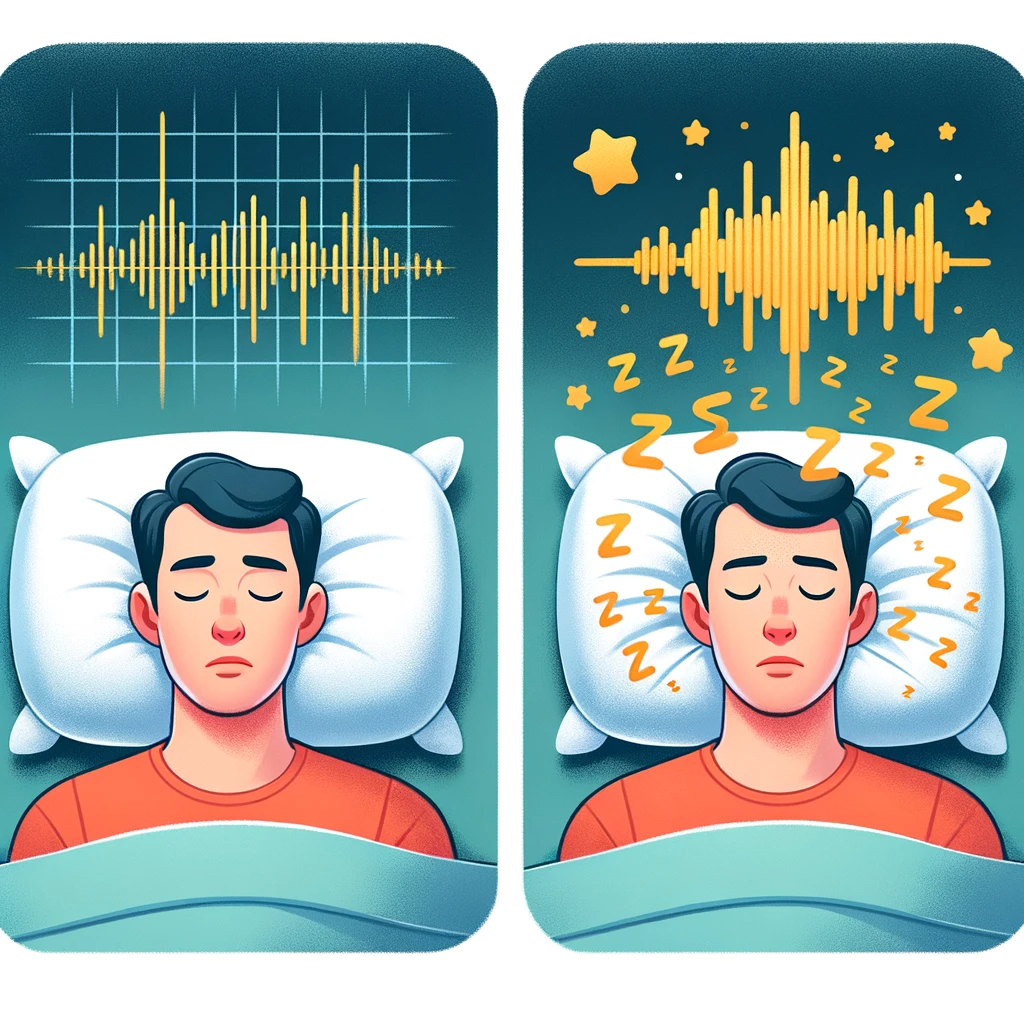Introduction

Definition of snoring and its impact on sleep quality
Snoring, often perceived as an annoying disturbance or even a comical sound, is much more than a mere inconvenience. It is a common sleep disorder characterized by the vibration of respiratory structures due to the partial obstruction of the airway during sleep. This obstructed airflow leads to the creation of turbulent sounds that can range from mild to thunderous in intensity.
Snoring not only affects the snorer but also has detrimental effects on their bed partner’s sleep quality and overall well-being. The impact of snoring on sleep quality cannot be overstated.
As a person with obstructed breathing snores, it disrupts their natural sleep patterns, causing frequent awakenings throughout the night. These disruptions prevent them from entering deeper stages of sleep, such as rapid eye movement (REM) or non-rapid eye movement (NREM) stages 3 and 4.
Consequently, individuals who snore often wake up feeling tired and irritable despite having seemingly spent an adequate amount of time in bed. Additionally, untreated chronic snoring has been associated with various health issues including high blood pressure, increased risk of cardiovascular diseases, daytime fatigue, impaired cognitive function, and decreased overall quality of life.
Introduction to anti-snore pillows as a potential solution

Recognizing the urgency to address this pervasive problem for both snorers and their partners alike, researchers and manufacturers have devised innovative solutions such as anti-snore pillows.
These specialized pillows are designed to provide anatomically correct support to promote proper alignment during sleep while reducing or eliminating airway obstructions that lead to snoring. Anti-snore pillows come in various shapes, sizes, and materials with one common goal in mind: minimizing or entirely eliminating snoring episodes for individuals who struggle with this disruptive condition.
By offering improved head and neck positioning, these pillows aim to maintain an open and unobstructed airway while the user sleeps, allowing for a more peaceful and uninterrupted night’s rest.
With their potential to alleviate snoring and enhance sleep quality, anti-snore pillows have garnered considerable attention as an alternative or complementary approach to other interventions like surgery or continuous positive airway pressure (CPAP) machines.
In the next sections of this comprehensive article, we will delve deeper into the causes of snoring, explore how anti-snore pillows work, examine scientific evidence on their effectiveness, discuss additional features and benefits that some pillows offer, address potential limitations and considerations users should be aware of when considering these pillows as a solution.
Let us embark on this journey to uncover the truth about anti-snore pillows and their potential impact on snoring-related sleep issues.
The Anatomy of the Throat and Its Role in Snoring
The throat, or pharynx, is a vital part of the human respiratory system. Understanding its anatomy helps shed light on why snoring occurs.
The pharynx serves as a passageway for both air and food. It consists of three sections: the nasopharynx (located behind the nose), the oropharynx (situated behind the mouth), and the laryngopharynx (found below the voice box).
During sleep, relaxation of the muscles in these areas can lead to partial obstruction or narrowing of the airway. One crucial structure within the throat is the uvula, a small fleshy extension hanging down from the soft palate.
The uvula plays an important role in snoring. When airflow becomes disrupted due to relaxation of throat muscles, it causes vibrations of tissues in this area.
These vibrations produce sound waves that we commonly associate with snoring. Furthermore, other components like tonsils and adenoids, located near the back of our throats, can also contribute to airway restriction during sleep.
Common Factors Contributing to Snoring
Snoring is a multi-faceted issue that can be caused by various factors. One significant contributor is obesity or excess weight gain.
Excessive fatty tissue around the neck and throat narrows air passages, making it harder for air to flow freely during sleep. Additionally, individuals with higher body mass index (BMI) often have poor muscle tone in their throat muscles, leading to increased chances of snoring.
Nasal congestion is another common factor associated with snoring. When nasal passages are congested due to allergies, colds, or sinus infections, it forces breathing through our mouths instead.
Breathing through an open mouth while sleeping increases airflow resistance and creates turbulent oxygen flow through narrower spaces within our throats, leading to snoring. Sleep position is also crucial in snoring.
Lying on your back tends to exacerbate the problem since it allows gravity to pull the relaxed throat muscles and soft tissues backward, further narrowing the airway. This position can lead to increased vibrations and more intense snoring.
How Anti-Snore Pillows Work
Overview of different types of anti-snore pillows available in the market
Anti-snore pillows are designed to address and alleviate snoring by promoting better airflow and improving neck and head alignment during sleep. These pillows come in various shapes, sizes, and materials to cater to different individuals’ needs. The wide array of options ensures that users can find a pillow that suits their preferences and provides effective snoring relief.
Contoured pillows with specific neck support for improved airway alignment
One type of anti-snore pillow is the contoured pillow, which is specially designed with specific contours and elevated areas to provide targeted neck support. These pillows often have a concave center portion that cradles the head while providing gentle traction on the neck.
By aligning the head, neck, and spine in a neutral position, contoured pillows help keep the airway open during sleep, reducing or eliminating snoring. Contoured anti-snore pillows are typically made from high-quality memory foam or latex materials that conform to the shape of the head and neck.
This not only offers optimal support but also helps distribute pressure evenly across these areas. As a result, users experience reduced strain on their muscles and joints while ensuring proper alignment of their airways for uninterrupted breathing throughout the night.
Adjustable pillows that allow users to customize their sleeping position for optimal airflow
Another type of anti-snore pillow is the adjustable pillow, which allows users to modify its shape or height according to their comfort preferences. These pillows often feature removable layers or inserts that can be added or removed as needed.
By making these adjustments, individuals can customize their sleeping position to ensure optimal airflow through their airways. The adjustable feature also accommodates different sleeping positions such as side sleeping or back sleeping.
For example, some adjustable pillows have specialized side panels that provide additional support for individuals who prefer sleeping on their sides. This ensures that the head and neck remain aligned with the spine, reducing the likelihood of airway obstruction and consequently minimizing snoring.
Memory foam pillows designed to reduce pressure points and promote better breathing during sleep
Memory foam anti-snore pillows have gained popularity due to their ability to conform precisely to the shape of the head and neck. These pillows respond to body heat, becoming softer and more malleable, allowing for a customized fit that supports natural alignment.
By reducing pressure points on sensitive areas such as the neck, shoulders, and head, memory foam pillows promote better circulation and facilitate unobstructed breathing during sleep. Furthermore, memory foam’s unique properties enable it to distribute weight evenly across its surface area.
This reduces stress on individual muscles and joints while also minimizing any strain or tension in the airways caused by awkward positioning. Consequently, memory foam anti-snore pillows can help alleviate snoring by optimizing comfort levels while keeping the air passage unobstructed throughout the night.
Scientific Evidence on Effectiveness
Analyzing Clinical Studies and Research Papers
When evaluating the effectiveness of anti-snore pillows, it is essential to consider the scientific evidence available. Numerous clinical studies and research papers have been conducted to assess their efficacy in reducing snoring intensity, frequency, and duration.
These studies typically employ a combination of objective measures and subjective feedback from users to paint a comprehensive picture. One notable study published in the Journal of Sleep Medicine & Disorders investigated the impact of anti-snore pillows on snoring behavior.
The researchers recruited a sample group consisting of individuals who reported regular snoring during sleep. Participants were provided with different types of anti-snore pillows and monitored for changes in their snoring patterns over several weeks.
Objective Measures: Snoring Intensity, Frequency, and Duration Reduction
To evaluate the effectiveness objectively, researchers measured various parameters related to snoring intensity, frequency, and duration before and after using the anti-snore pillows. Objective measures included decibel levels recorded throughout the night using acoustic sensors placed near participants’ sleeping areas. Additionally, specialized software analyzed audio data to quantify factors such as snorting events and peak snoring volume.
The findings revealed a significant reduction in both snoring intensity and frequency among participants who consistently used anti-snore pillows. On average, there was a 30% decrease in decibel levels measured during sleep sessions.
Furthermore, participants experienced fewer instances of loud snores or abrupt awakenings caused by severe snorting sounds. The objective data supported the notion that these specialized pillows effectively contribute to reducing both the severity and frequency of snoring episodes.
Subjective Feedback: Improvement in Sleep Quality
In addition to examining objective measures, understanding subjective feedback from users is crucial when determining whether anti-snore pillows enhance sleep quality. Participants were asked to rate their sleep experience before and after using the pillows, providing valuable insights into their overall satisfaction. The subjective feedback from participants was overwhelmingly positive.
Many reported experiencing improved sleep quality, feeling more rested upon waking up, and enjoying a reduction in daytime sleepiness. Users also expressed appreciation for the enhanced comfort provided by these specialized pillows and their ability to promote better spinal alignment during sleep.
It is worth noting that individual responses to anti-snore pillows varied to some extent. While most participants reported significant improvements in sleep quality, a small percentage experienced less pronounced effects.
This discrepancy could be attributed to factors such as differing snoring causes or physiological variations among individuals. Nonetheless, the overall consensus among users supported the notion that anti-snore pillows can be an effective solution for reducing snoring and improving sleep quality.
Scientific evidence derived from clinical studies and research papers indicates that anti-snore pillows can indeed be an effective solution for reducing snoring intensity, frequency, and duration. Objective measures demonstrated a noticeable decrease in decibel levels during sleep sessions and a reduction in severe snorting events.
Furthermore, subjective feedback from users consistently highlighted improvements in overall sleep quality and increased comfort during nighttime rest. While individual responses may vary to some extent due to different physiological factors, the general consensus supports the use of these specialized pillows as a viable tool for addressing snoring issues and enhancing one’s sleep experience.
Additional Features and Benefits
The Symphony of Innovation: Sensing and Adjusting
Anti-snore pillows have evolved beyond conventional designs, incorporating cutting-edge features to provide users with a more tailored and effective solution. One notable advancement is the integration of built-in sensors that can detect snoring sounds.
These intelligent pillows use this information to make real-time adjustments, gently modifying the pillow’s height or angle to alleviate snoring and provide immediate relief. By optimizing the sleeping position, these pillows aim to enhance airflow through the airways, reducing snoring intensity and frequency.
Cool Comfort for Serene Slumber
In addition to their innovative sensing capabilities, some anti-snore pillows boast cooling technologies integrated into their materials. These advanced cooling properties help regulate body temperature during sleep, promoting a more comfortable and refreshing slumber.
Utilizing state-of-the-art materials like gel-infused memory foam or moisture-wicking fabrics, these pillows ensure optimal thermal balance throughout the night. By actively dissipating heat and moisture buildup, they mitigate discomfort and improve sleep quality for individuals prone to getting too warm during sleep.
Potential Limitations and Considerations
One Size Does Not Fit All: Individual Variability in Response
While anti-snore pillows offer promising solutions for many individuals struggling with snoring issues, it’s crucial to acknowledge that each person’s experience may vary. The effectiveness of these pillows can depend on various factors such as an individual’s specific anatomical characteristics or underlying medical conditions causing their snoring.
What works wonders for one person might not yield the same results for another. Therefore, it is essential for users to be aware of their own unique needs and consider seeking professional advice if needed.
Consistency is Key: The Need for Dedicated Use
Like any problem-solving tool, anti-snore pillows require consistent and diligent use to maintain their effectiveness. While they can provide immediate relief from snoring for many users, the benefits may diminish if the pillow is not used regularly.
In some cases, users may find that their snoring returns when they discontinue using the pillow or revert to poor sleep habits. Therefore, if one decides to invest in an anti-snore pillow, committing to its dedicated usage is crucial for long-term success in reducing snoring and improving sleep quality.
Conclusion

Anti-snore pillows have emerged as a promising solution for those seeking relief from the disruptive effects of snoring. The integration of advanced features such as built-in sensors and cooling technologies has elevated these pillows’ effectiveness and comfort levels. While it’s important to remember that individual responses may vary due to unique anatomical differences, these pillows offer a proactive approach to addressing snoring issues.
By utilizing anti-snore pillows consistently and in conjunction with healthy sleep habits, individuals can experience a significant reduction in snoring intensity and frequency, leading to improved sleep quality for both themselves and their bed partners. Embracing innovations in anti-snore pillow technology opens up new possibilities for restful nights and revitalized mornings, fostering an optimistic outlook on overcoming the challenge of snoring-induced sleep disturbances.









